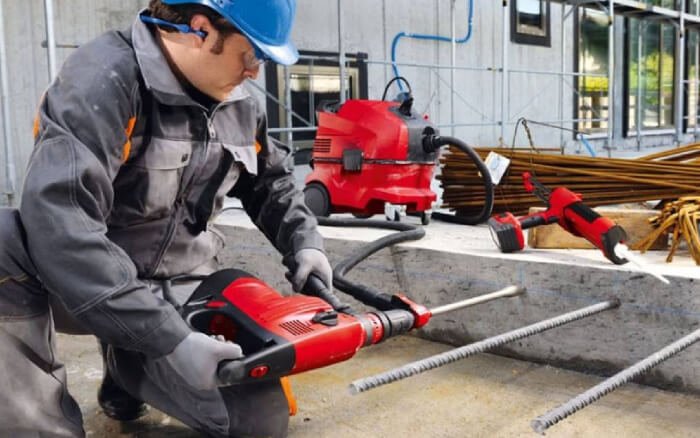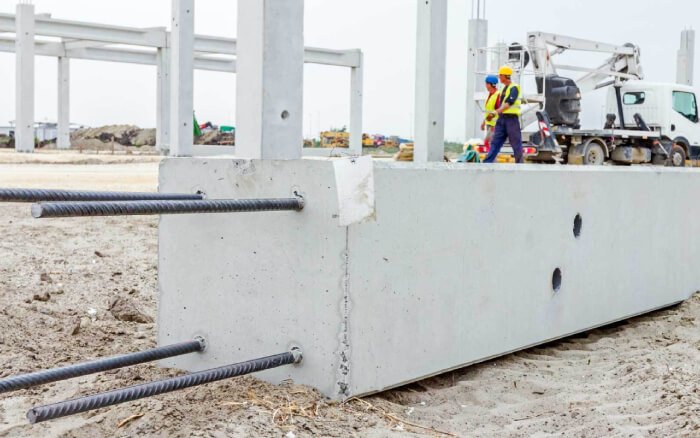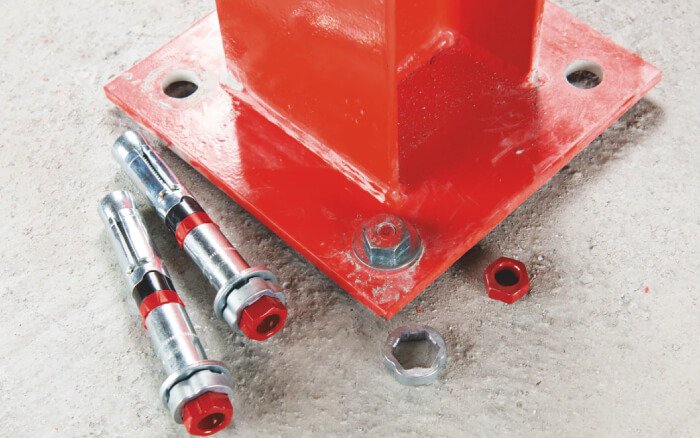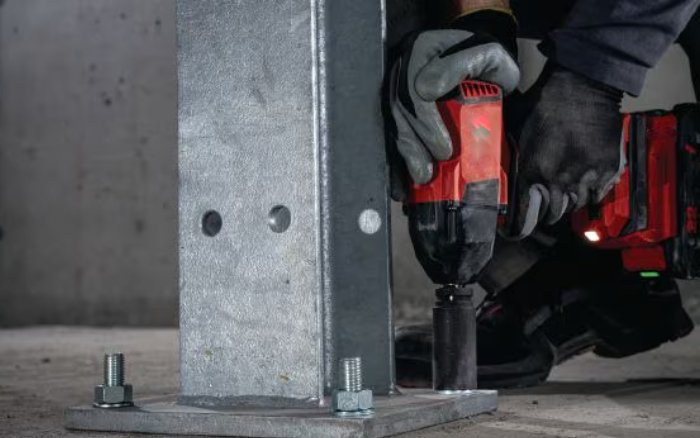What is Chemical Anchor Fastening?
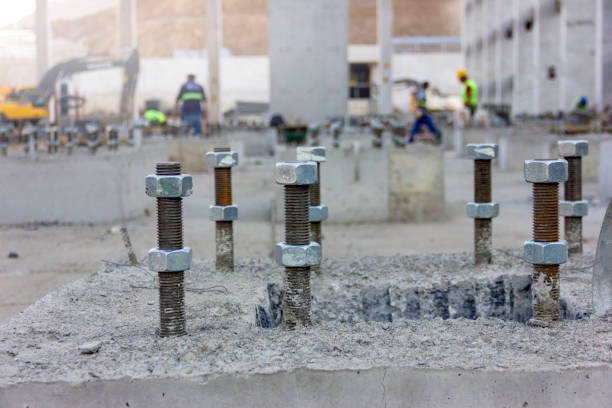 Chemical anchor fastening is a technique used to securely attach components, fixtures, or structures to concrete, masonry, or other solid materials using a chemical adhesive. Unlike traditional mechanical anchors, chemical anchors rely on a resin or epoxy-based adhesive to bond the anchor to the base material. This method provides exceptional holding power and is ideal for situations where other anchoring methods might not be effective, such as in cracked concrete, soft or brittle substrates, and areas requiring higher load capacity.
Chemical anchor fastening is a technique used to securely attach components, fixtures, or structures to concrete, masonry, or other solid materials using a chemical adhesive. Unlike traditional mechanical anchors, chemical anchors rely on a resin or epoxy-based adhesive to bond the anchor to the base material. This method provides exceptional holding power and is ideal for situations where other anchoring methods might not be effective, such as in cracked concrete, soft or brittle substrates, and areas requiring higher load capacity.
How Does Chemical Anchor Fastening Work?
Chemical anchor fastening involves the following process:
- Drill the Hole: The first step is to drill a hole into the base material (concrete, masonry, etc.) where the anchor will be installed.
- Clean the Hole: It is essential to clean the hole thoroughly to remove any dust, debris, or contaminants that could affect the bonding process. This is typically done using a brush or compressed air.
- Inject the Adhesive: Once the hole is cleaned, a chemical adhesive (usually an epoxy or polyester resin) is injected into the hole.
- Insert the Anchor: After injecting the adhesive, the anchor is placed into the hole, where it bonds with the resin and base material as it cures.
- Allow the Adhesive to Cure: The adhesive must cure and set, forming a strong bond between the anchor and the base material. The curing time varies depending on the type of adhesive used and environmental conditions.
Types of Chemical Anchors
There are several types of chemical anchors designed to suit different applications and environmental conditions. Some common types include:
- Epoxy Anchors: Epoxy anchors provide excellent bonding strength and resistance to harsh environmental conditions. They are ideal for high-strength applications, such as in structural and heavy-duty fastening.
- Polyester Resin Anchors: Polyester resin anchors are faster-curing than epoxy anchors and are typically used in medium-duty applications. They provide good strength and performance in normal conditions.
- Vinylester Resin Anchors: Vinylester resin anchors are suitable for use in aggressive environments, such as those exposed to chemicals, moisture, or extreme temperatures. They offer a balance between strength and curing time.
- Hybrid Resins: Hybrid resins combine the benefits of epoxy and polyester resins, offering fast curing times and excellent strength. They are versatile and used in a variety of construction applications.

Advantages of Chemical Anchor Fastening
Chemical anchor fastening provides several benefits over traditional mechanical anchoring methods:
- High Load-Bearing Capacity: Chemical anchors provide superior strength and can support heavy loads, making them ideal for critical applications such as structural reinforcement and machinery mounting.
- Superior Bonding: Chemical anchors form a chemical bond with the base material, ensuring a strong, durable, and long-lasting connection.
- Use in Cracked or Soft Concrete: Unlike mechanical anchors, chemical anchors can be used in cracked, damaged, or soft concrete, providing reliable fastening in challenging conditions.
- Corrosion Resistance: Chemical anchors, especially those made with epoxy or polyester resins, provide excellent corrosion resistance, making them suitable for use in harsh environments such as marine or industrial settings.
- Versatility: Chemical anchors can be used in a variety of base materials, including concrete, masonry, brick, and stone, providing flexible fastening solutions for different construction needs.
- Minimal Expansion: Chemical anchors expand less than mechanical anchors, which is particularly useful when dealing with materials sensitive to expansion forces.
Applications of Chemical Anchor Fastening
Chemical anchor fastening is widely used in various construction and engineering projects. Some typical applications include:
- Structural Reinforcement: Chemical anchors are often used to reinforce structural components, including foundations, beams, and columns, in both new construction and renovation projects.
- Mounting Machinery and Equipment: Chemical anchors are used to secure heavy machinery and equipment in industrial settings, where high strength and durability are required.
- Facade Installation: In building facades, chemical anchors are used to attach cladding, panels, and decorative elements, providing a secure and aesthetically pleasing solution.
- Fencing and Barrier Installation: Chemical anchors are used to fasten fences, barriers, and guardrails, ensuring they remain securely in place even in challenging environments.
- Bridge and Tunnel Construction: In infrastructure projects, such as bridges and tunnels, chemical anchors are used to secure structural elements and reinforcement bars in concrete, offering high-performance fastening in complex conditions.
Choosing the Right Chemical Anchor
When selecting a chemical anchor for your project, consider the following factors to ensure optimal performance:
- Base Material: Choose a chemical anchor suitable for the base material (concrete, masonry, brick, etc.) to ensure strong bonding and maximum performance.
- Load Capacity: Consider the weight and load requirements of the components being fastened. Ensure that the chemical anchor can support the necessary load for your application.
- Environmental Conditions: Evaluate the environmental conditions, such as moisture, temperature, and exposure to chemicals, and choose an anchor resin that offers the necessary resistance (e.g., epoxy for high strength, vinylester for chemicals).
- Curing Time: Select a chemical anchor with a curing time that fits your project schedule. Some resins cure quickly, while others may take longer to set.
Why Choose Chemical Anchor Fastening?
Chemical anchor fastening offers an array of advantages, making it an excellent choice for applications that require strong, durable, and reliable fastening solutions. Here are a few reasons to choose chemical anchors for your projects:
- Reliable Performance: Chemical anchors provide superior bonding strength and reliability, ensuring long-lasting performance in various environments.
- Ideal for Challenging Conditions: Chemical anchors are perfect for use in cracked, damaged, or soft concrete, where mechanical anchors may not perform as effectively.
- Corrosion Resistance: Chemical anchors, especially those made from epoxy or vinylester, offer excellent corrosion resistance, making them suitable for harsh environments such as marine or industrial settings.
- Minimal Expansion: Chemical anchors have less expansion than traditional mechanical anchors, reducing the risk of damage to base materials that are sensitive to expansion forces.
Conclusion
Chemical anchor fastening is an effective and versatile method for securing components to concrete, masonry, and other solid materials. Offering high strength, corrosion resistance, and reliability, chemical anchors are ideal for use in a wide range of applications, including structural reinforcement, machinery mounting, and facade installation. By selecting the right chemical anchor for your specific project, you can ensure a secure, long-lasting connection that meets your fastening needs.


